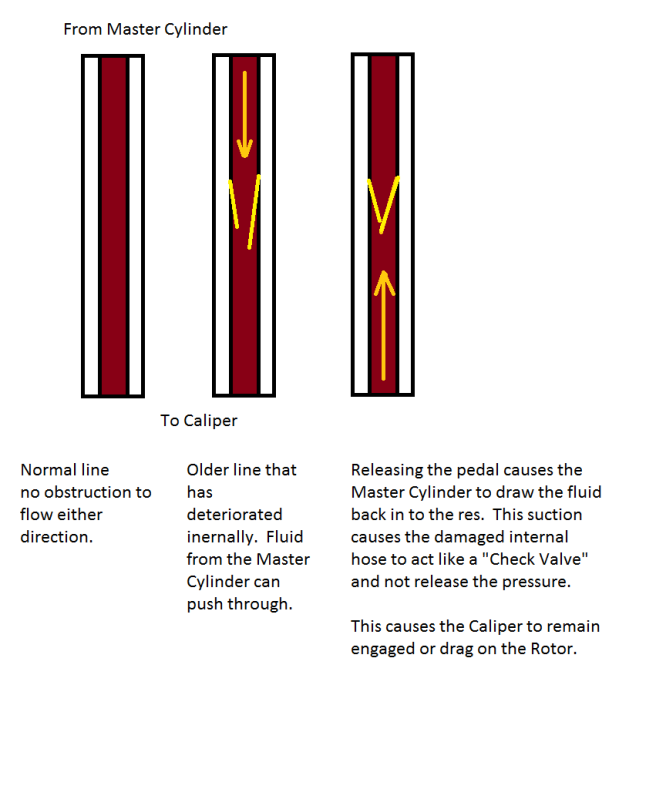Brakes feeling spongy and no actual "braking" until pedal is at the floor..
Posted
#1556383
(In Topic #208849)
Settled In

I have now gone round the car several times in the correct order and even zip tied the rear brake compensator in place while bleeding (read this was required to bleed rears properly) and definitely see no air bubbles when bleeding from any of the bleed nipples.
At present the brakes are still alittle spongy with no actual braking until my foot is pretty much to the floor I also see no leaks from the drums or the calipers themselves so I'm out of ideas…any help or helpful troubleshooting tips would be greatly appreciated.
Posted
Moderator



I find that I also need a helper to push the pedal when using an easy bleed kit as otherwise the pedal is a long way down before full braking is achieved.
If you can take a wheel off and press the pedal hard see if the flexi pipes are moving, they can become odd with age and do weird stuff.
Apart from that, your master cylinder seals may be on the way out.
Posted
Old Timer

Posted
Settled In

borednow said
Did you change the brake fluid? As if it's older then 2 yrs it can collect water which compresses and gives a spongy feeling.
I find that I also need a helper to push the pedal when using an easy bleed kit as otherwise the pedal is a long way down before full braking is achieved.
If you can take a wheel off and press the pedal hard see if the flexi pipes are moving, they can become odd with age and do weird stuff.
Apart from that, your master cylinder seals may be on the way out.
Hi,
Yeah I have flushed out the brake fluid and have also tried by someone pressing the brake pedal rather than using the bleeding with no effect.
I guess when I get home I will check if the flexi pipes move when the brakes are pressed…they certainly look quite old.
I'l be moving onto replacing the master cylinder next I think as im quite sure there is no longer any air in the system.
Posted
Local Hero

The other ways aren't easily noticed unless you are watching or feeling them as some one depresses the pedal.
The insides of the rubber lines can delaminate, and act as check valves on depression of the pedal, as in staying on, or restricting the flow depending on how it separates internally.
 Suspect this if you can't bleed one side. as in you can remove the bleeder port and still nothing comes out.
Suspect this if you can't bleed one side. as in you can remove the bleeder port and still nothing comes out.They can also balloon or expand under pressure and reduce the total pressure to the wheel cylinder or caliper.
I have had the latter happen and a rubbed line that caused a rupture. Inspect your lines and hold your hand tight to the line as some one depresses the pedal and you can feel what I mean.
I replaced the hard rubber lines on my Cabbies after I first got them new to me, that is front and rear, well I rebuilt the entire braking system including e-brake cables.
While the first ones I did where night and day different, it wasn't until I used the Stainless Steel Braided lines that kept the ballooning at total bay, and I have a hard feel to the brakes. I have since only advocated the Stainless Steel Braided lines, however I usually opt for the teflon ones, cost more but I like them.
The Master Cylinders can leak internally that is as you press the pedal fluid can move both ways reducing the pressure to the pads or cylinders. On older MC's rust can form on the internal metal bits and actually cause the seals to wear.
I guess what I am trying to say is if your lines look dry, and checkered then replace them with new ones whether you do the Stainless, or OEM, you will at least have the knowledge that you won't have a failure at that point.
The front lines while ballooning also get a twist wear from turning.
What do Divorces, Great Coffee, and Car Electrics all have in common?
They all start with GOOD Grounds.
Where are my DIY Links?
They all start with GOOD Grounds.
Where are my DIY Links?
0 guests and 0 members have just viewed this: None.









